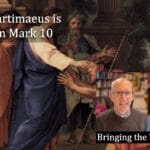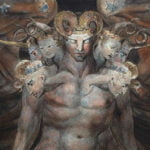The lectionary reading for Trinity 4 in this Year B is Mark 4.35–41 (the reading for Trinity 3 in other Years B), the account of Jesus calming the storm. It is a fabulous story both full of little eye-witness details, and yet at the same time impossible to read without feeling its symbolic significance. Unlike Matthew, Mark does not bridge the literal story to its symbolic reading, but the story is so vivid he can leave that to us!
Although there is a clear link at the beginning of this story with the teaching in parables that has gone before (‘On that day…’) our chapter divisions hinder rather than help us here. This is the beginning of a quite long section, between the teaching of chapter 4 and the next section of teaching in chapter 7, when Jesus is at the centre of a serious of dramatic and dynamic miracle stories. This section includes six of Jesus’ best-known miracles in the gospels: the calming of the storm; the deliverance of the Gerasene demoniac; the raising of Jairus’ daughter; the healing of the woman with an issue of blood; the feeding of the 5,000; and Jesus walking on the water.
Together, these stories depict Jesus as dynamic and powerful, the agent of God’s miraculous power.
Come and join James and Ian as they explore this texts, its meaning, and its implications for live, ministry, and preaching.
 Buy me a Coffee
Buy me a Coffee




























A delightful half hour! Thankyou James and Ian.
The revelation of James’s humility was astonishing[!]
I aim to send him a copy of my book
The Ten Most Humble Men In The World
{ And how I trained the other nine }
Interesting you identify the boat as a symbol of the Church.
No doubt, the Church has passed through many a storm
and in danger of being overwhelmed, as she currently is.
Perhaps this incident speaks to us in our day?
Who can still the storm? Will we rest in/with God
Or will we engage in all aspects of fear and loathing,
manning the pumps, so to speak.
Thanks. ‘Interesting you identify the boat as a symbol of the Church’ No, that is not us; that is Spurgeon.
I stand corrected Ian,whatever.
Thanks both for this.
A sermon on this passage a few weeks ago made out the western shore was the peaceful life of the church and the far side was the mission field. Living by faith involves much turmoil out on the sea and scary moments on the other side.
There is an interesting aspect in the word cushion, from the french word pig. I wonder if someone has ever made something of this with reference to what happened on the other side?
Looking at the greek it seems the word proskephalaion is part of the boat. Perhaps a buffer hung over the prow when approaching a pier or something similar. I imagine Jesus has swung it over the prow so he can use it as a bolster to rest on.
According to LSJ it is: “cushion for the head, pillow,” so perhaps not something he would have sat on. This fits with Jesus being asleep.
If it were part of the ship, it would be “towards the bow”, I agree. However, that conflicts with Jesus being asleep in the prumna – the stern (which is found also in Acts 27).
Praps a boat had protection from damage at both ends!
David is correct: the term is pros (for) kephalaion (the head).
Talking to my other sailing friends proskephalaion probably means a headboard or similar, not something soft to lie on. Fenders (the cushion type things that are soft) are called μπαλόνια plural.
Good! That’s more like it. Out with the pillow!
I don’t think there is any warrant for that at all.
The Greek term means…’cushion’.
Note that in modern Greek mp is used for B since beta now sounds like v.
So the word for fender you cite is ‘balonia’ or balloons.
Yeah but why would they ever have something soft to protect the bow. That’s almost unheard of. You protect the sides of the boat for docking. The board (headboard) could be what we call the passerelle if they’re doing bow to mooring but you absolutely never want to have either bow or stern bumping a dock. Need to look at archeological remains of boats that era but at the moment it really doesn’t make sense from a sailing point of view. Med tradition is stern to mooring but that’s quite complex so historically it’s been alongside mooring. But my expectation is that as working fishermen they anchored and waded ashore. That’s certainly what was done a couple of hundred years ago here. The headboard could also have been something like a bowsprit tied in place for fishing. I really don’t get this as being a cushion — working boats wouldn’t have them.
Richard ‘working boats wouldn’t have one…’. Precisely. That is what makes it so interesting. In the video speculate who might have brought the cushion; but the fact that there was one makes the detail so interesting.
There is no suggestion that this is something that the fishermen would have had in the boat for fishing.
The French for pig is cochon, which is an imitation of its sound.
The English ‘cushion’ derives ultimately from the Latin coxa for hip, which you might rest on a cushion.
The two words are completely unrelated.
Doh, 🙂
I’m taking my ball and home.
If Id been there, Id have been the one who brought a cushion to sit on. And been annoyed if Jesus had taken it.
Hi Ian. I’m wondering what Jesus was asking from the disciples when he accused them of little faith? Was he suggesting that because he was in the boat with them that they could trust that it wouldn’t be swamped or sink?
I suppose given they could see he was having a nap (I love naps) despite the storm which they knew at other times could have sunk the boat, they should have known, well, if he’s asleep there’s nothing to worry about. They ‘should’ have had peace instead of panicking.
But I know I would have been more like doubting Thomas, already throwing up over the side. Where’s my Kwells?
Jesus actions were perceived like we would think of someone we thought we knew if they produced a concealed gun and shot dead a charging bull. One is shocked and relieved that the imminent danger has been averted but then fearful of someone in possession of a gun. How did they come to have a gun? Why? Should I be worried, miles from habitation, alone with such a one? It took time for the disciples to trust such a formidable person as Jesus showed Himself to be.
Berean Standard Bible
4:39 And he arose, and rebuked the wind, and said unto the sea, Peace, be still. And the wind ceased, and there was a great calm.
I pray you will forgive a personal story
A story repeated on several occasions in various ways during my time as a Nurse working at the City Hospital [Patience 2 Ward} at the turn of the decade.
In the morning, I read our passage; reflecting on,
from a place of rest to a demonstration of power.
It occurred to me that we {as nurses} frequently experienced
people manifesting pain and rage and mental “brainstorms” of one kind or another.
If Jesus can still storm perhaps, He could /would, still these frequent “storms”
today,
On that day we had a patient who was quite seriously mentally sick
[I forget his reason for admission]
A man of about 2O yrs. old, very disturbed in mind, sitting cross legged in the middle of his bed, wearing headphones and listening to heavy, heavy metal music.
Two female nurses wanted to treat him and his response was loud incoherent shouting and hitting the nurses, at which point they called for me to intervene.
Very quietly I said “Peace, be still”
He began to shriek even louder, the storm increased! [this I found a regular feature]
“I know what you are trying to do !!” he shouted, gradually over a minute or two his rage subsided. The nurses could proceed to treat him.
A couple of days later the chief physician came to do his weekly ward round.
Along with a posse of junior and trainee doctors and allied medical staff plus me.
The lad was sitting cross legged on the bedside armchair listening to his music,
On seeing us all arriving he shouted out and pointed at me
“He’s got Jesus!! “ and promptly fell forward onto his face out of his chair, still sitting cross legged and silent.
The team just thought he was raving as usual.
Similarly, my wife was at a Daily Briefing Meeting for all heads of departments at the University Hospital Nottingham.
People were commenting on the manic storm of activity the previous day when someone commented “Frantic! and then it suddenly became dead quiet!”
My wife spoke up “That was me, I asked God to “hold all phone calls “ [her phone had been ringing off the hook as she was trying to drain the swamp the crocodiles were out in force]
Not only did He stop all phone calls for my wife He stopped them for everyone, storm calmed!
The teaching of Jesus is not about theories but about power
PSALM 149:5 Let the saints be joyful in glory: let them sing aloud upon their beds.
[Their place of rest]
149:6 Let the high praises of God be in their mouth, and a two-edged sword in their hand;
149:8 To bind their kings with chains, and their nobles with fetters of iron;
149:9 To execute upon them the judgment written:
this honour have all his saints.
Praise ye the LORD.
The gospel does not exist in words alone .
1 Cor 4:20 For the kingdom of God is not in word, but in power.
Think of how many words and disputes about words that are daily written, and consider how many works of power are manifested.
Interesting experiences.